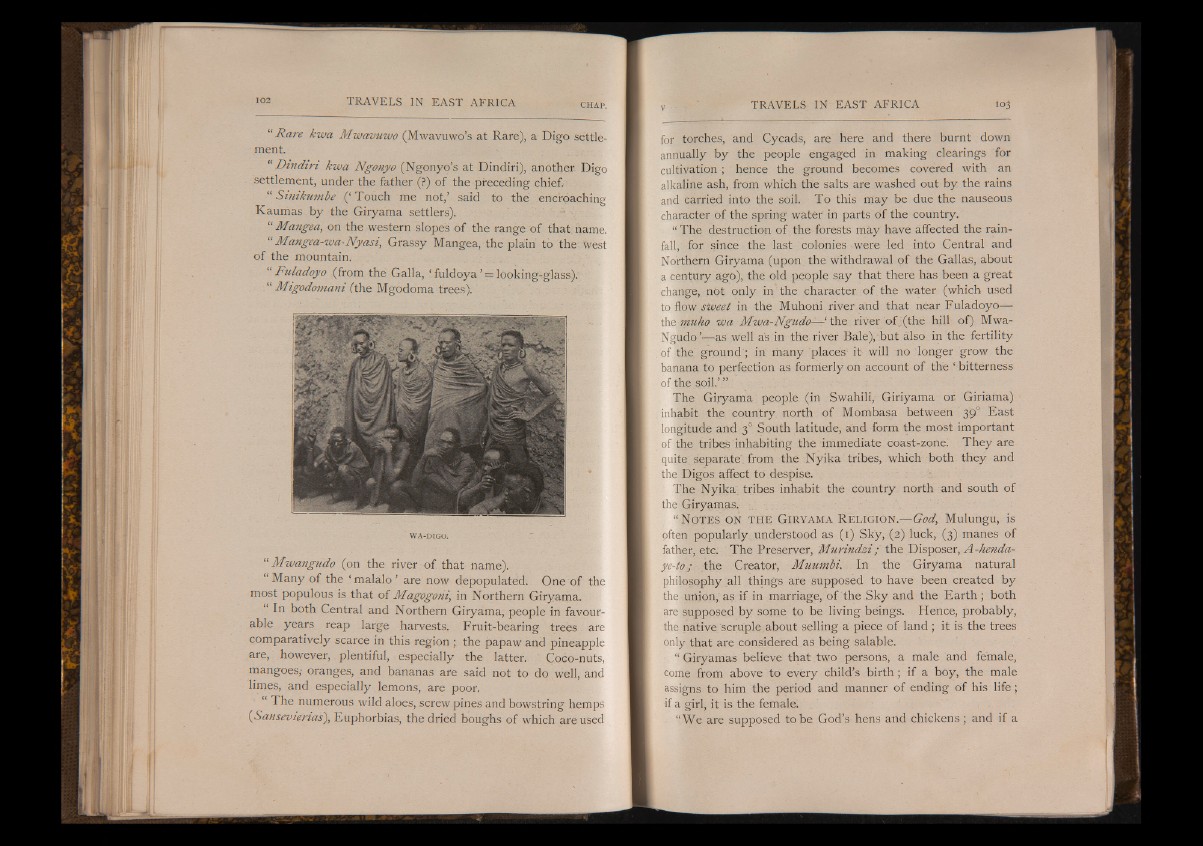
“ Rare kwa Mwavuwo (Mwavuwo’s at Rare), a Digo settlement.
“ Dmdiri kwa Ngonyo (Ngonyo’s at Dindiri), another Digo
settlement, under the father (?) of the preceding chief.
“ Sinikumbe (‘ Touch me not,’ said to the encroaching
Kaumas by the Giryama settlers).
“ Mangea, on the western slopes of the range of that name.
“ Mangea-wa-Nyasi, Grassy Mangea, the plain to the: West
of the mountain.
“ Fuladoyo (from the Galla, ‘ fuldoya’ = looking-glass).'
“ Migodomani (the Mgodoma trees).
WA-DIGO.
“ Mwangudo (on the river of that name).
“ Many of the ‘malalo’ are now depopulated. One of the
most populous is that of Magogoni, in Northern Giryama.
“ In both Central and Northern Giryama, people in favourable
years reap large harvests. Fruit-bearing trees are
comparatively scarce in this region ; the papaw and pineapple
are, however, plentiful, especially the latter. Coco-nuts,
mangoes; oranges, and bananas are said not to do well, and
limes, and especially lemons, are poor.
“ The numerous wild aloes, screw pines and bowstring hemps
{Sanseviertas), Euphorbias, the dried boughs of which are used
for torches, and Cycads, are here and there burnt down
annually by the people engaged in making clearings for
cultivation; hence the ground becomes covered with an
alkaline ash, from which the salts are washed out by the rains
and carried into the soil. To this may be due the nauseous
character of the spring water in parts of the country.
1 The destruction of the forests may have affected the rainfall/
for since the last colonies -were led into Central and
Northern Giryama (upon the withdrawal of the Gallas, about
a century aigo), the old people say that there has been a great
change, not only in the character of the water (which used
to flow sweet in the Muhorii river and that near Fuladoyo-|§|
the muho wa Miva-Ngudo— ‘ the river of;(the hill of) Mwa-
Ngudo’— as wejl as.in the river Bale), but also in the fertility
of the ground; in many places' it will no longer grow the
banana to perfection as formerly on account of the ‘ bitterness
of the sofl.’ ”
The Giryama people (in Swahili, Giriyama or Giriama)
inhabit the country north of Mombasa between 390 East
longitude and 30 South latitude, and form the most important
of the tribes inhabiting the immediate coast-zone. They are
quite separate , from the Nyika tribes, which both they and
the Digos affect to despise.
The Nyika tribes inhabit the country north and south of
the Giryamas.
“ N o t e s o n t h e G ir y a m a R e l ig io n .— God, Mulungu, is
pften popularly understood as (l) Sky, (2) luck, (3) manes of
father, etc. The Preserver, Murindzi; the Disposer, A-henda~
ye-to; the Creator, Muumbi. In the Giryama natural
philosophy all things are supposed to have been created by
the union, as if in marriage, of the Sky and the Earth; both
are supposed by some to be living beings. Hence, probably,
the native scruple about selling a piece of land; it is the trees
only that are considered as being salable.
“ Giryamas believe that two persons, a male and female,
come from above to every child’s birth; if a boy, the male
assigns to him the period and manner of ending of his life ;
if a girl, it is the female.
“We are supposed to be God’s hens and chickens ; and if a